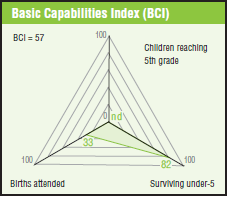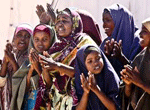Somalia
Progress towards the MDGs
Despite the vision of the Somali Reconstruction and Development Programme (RDP), a pro-poor instrument and support from the international community, Somalia is unlikely to meet most, if not all, of the Millennium Development Goals (MDGs) by 2015. Almost 66% of the population is living in severe poverty. Moreover, with another food crisis looming on the horizon, Somalia will not be able to recover from the worst famine in 60 years, one that affected over one-third of its population in 2011. Armed conflict continues in many areas of the country and the international aid system is unable to meet basic needs: again 857,000 are now in need of emergency aid. Ambitious plans of governments are always thwarted by fierce armed insurgency, and the aid agencies strive to mitigate the impacts as the disasters come and go. Somalia is amongst the largest aid recipients in the world. But why progress is not made towards the MDGs? Why the country is unable to break the vicious cycle of crisis?
Published on Thu, 2013-05-30 13:12
Despite the vision of the Somali Reconstruction and Development Programme (RDP), a pro-poor instrument and support from the international community, Somalia is unlikely to meet most, if any, of the Millennium Development Goals (MDGs) by 2015. Almost 66% of the population is living in severe poverty. Together with the rest of Horn of Africa, Somalia is now recovering from the worst famine in 60 years, affecting over one-third of its population, armed conflict continues in many areas of the country and the international aid system is unable to meet basic needs: 3.8 million are still in need of emergency aid. With the election of a reform-minded president and speaker of parliament at the end of 2012, will the country be able to overcome these challenges and improve people’s livelihoods? At a time when major breakthroughs were taking place in the field of development, including the release of first Human Development Report in 1990, Somalia was in its death throes. Moreover, the two decades of armed conflict that followed the state collapse in 1991 have taken a heavy toll on people, institutions, the economy and the environment. |
|
Published on Mon, 2010-01-18 13:01
After many years of indiscriminate mortar shelling and endless human rights abuses, the poor people of Somalia are left with little hope or expectations of peace and stability. The destruction that has been inflicted on the Somali people is unprecedented in the recent history of Africa as the perpetrators are rarely called to account for their crimes. |
|
Published on Thu, 2007-12-20 09:34
Thirty participants attended a workshop held at the Mogadishu' Sahafi II hotel on Tuesday and Wednesday 20th and 21st of November 2007. SOCDA organised the gathering in order to highlight the importance of civil society networks. |
SUSCRIBE TO OUR NEWSLETTER




